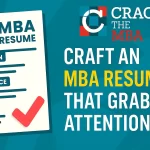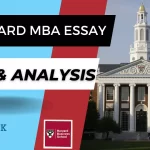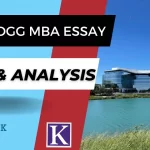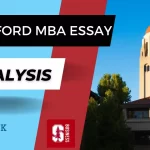MBA Essay Tips: 5 Expert Strategies to Write a Compelling MBA Essay
Applying to Harvard is not an essay-writing contest,” said Dee Leopold, former Director of Admissions at Harvard Business School. Her advice still holds true: the most powerful MBA essays are not the most poetic—they’re the most authentic. Business schools aren’t looking for literary masterpieces; they’re looking for real stories that reflect your values, choices, and leadership potential.
If you’re applying to a top MBA program, your MBA essay is your chance to stand out by showcasing who you are beyond your resume and test scores. But writing a compelling essay starts long before you open a blank document; it begins with reflecting on the experiences that shaped you.
In this article, we’ll walk you through exactly what admissions committees look for in an MBA essay and share expert MBA essay tips to help you write a standout story that gets noticed.

First, let’s understand the types of MBA essays:
Types of MBA essays
If you’re applying to top MBA programs, you’ll likely encounter a range of MBA essay types, each designed to evaluate different facets of your personal and professional journey. Based on trends from top schools like Harvard, Stanford, Wharton, and others, here are the eight most common types of MBA essays that cover 80–90% of application requirements.
- Goals essay
- Self-Reflection essay
- Contribution & Impact essay
- Leadership & Teamwork essay
- Video essay
- Optional essay
- Application form essay
- Creative essay
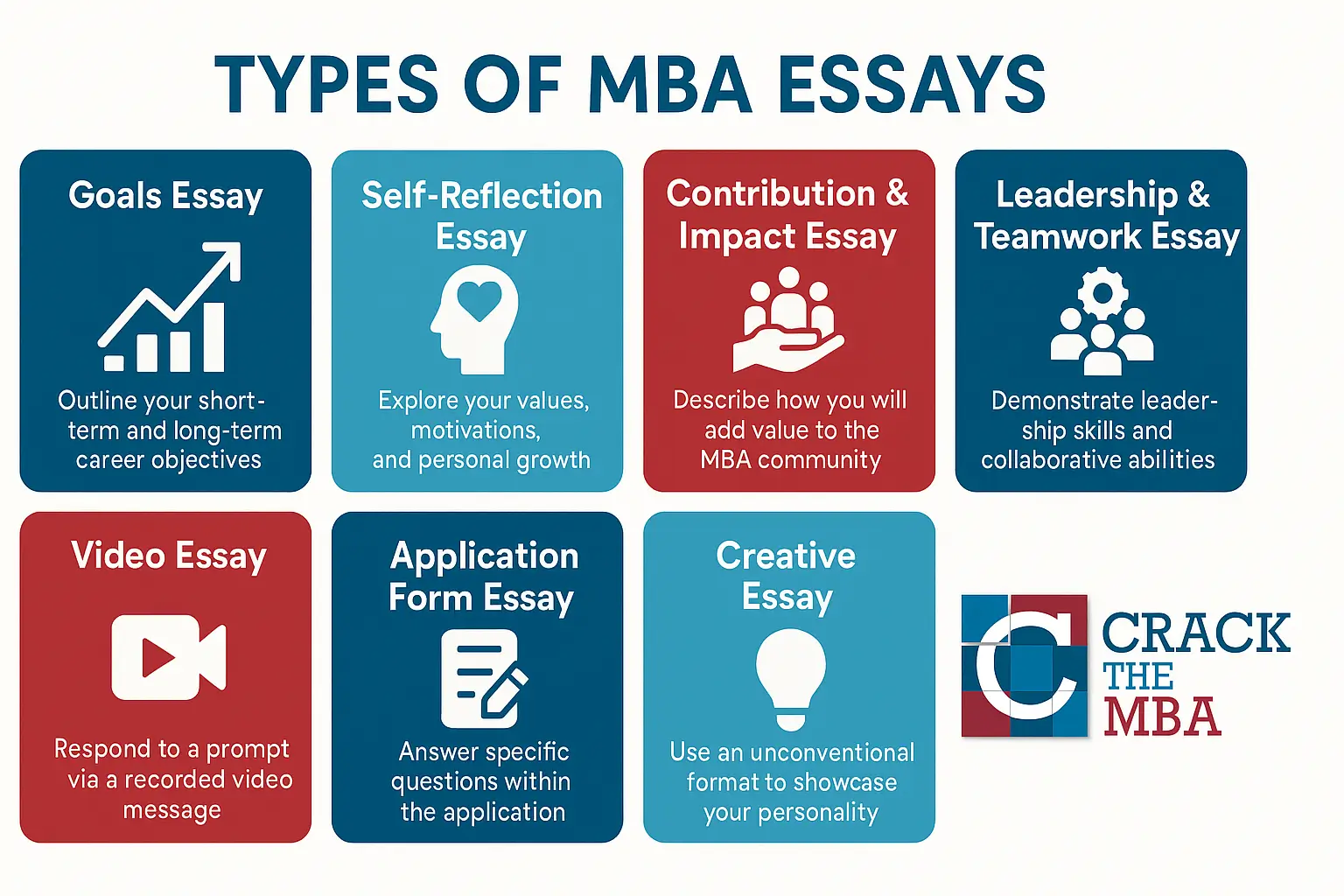
1. Goals Essay
The MBA goals essay asks: What do you want to do after your MBA? Schools want to see clear, achievable, and well-researched short-term and long-term career goals—and how their MBA helps bridge that gap.
Examples:
- Wharton: How do you plan to use the Wharton MBA program to help you achieve your future professional goals? (500 words)
- Columbia (Essay 1): What are your career goals over the next three to five years, and what is your long-term dream job? (500 words)
- Texas McCombs: What ambitious goal or change do you aim to achieve with an MBA, and why is Texas McCombs your ideal launch pad? (250 words)
MBA Essay Tip: Be specific about function, industry, and geography. Show logical progression from past to future, and connect goals to program strengths.
2. Self-Reflection Essay
This introspective MBA essay explores your values, motivations, challenges, or identity. It helps the admissions committee understand who you are beyond your resume.
Examples:
- Stanford GSB: What matters most to you, and why? (650 words)
- Berkeley Haas: What makes you feel alive when you’re doing it, and why? (300 words)
- Georgetown McDonough (Cura Personalis): Reflect on a time you supported someone and what that says about you.
MBA Essay Tip: Dive deep. The best MBA essays in this category are highly personal, not just professionally safe stories.
3. Contribution & Impact Essay
This MBA essay type focuses on how you’ll contribute to the school’s community, culture, and learning environment.
Examples:
- Wharton: How do you plan to make specific, meaningful contributions to the Wharton community? (400 words)
- Cornell Johnson: How do you intend to make a meaningful impact on the Johnson community? (350 words)
- Fuqua: What are 3 ways you expect to contribute at Fuqua?
MBA Essay Tip: Highlight specific clubs, initiatives, or values. Go beyond buzzwords—be real and relevant.
4. Leadership & Teamwork Essay
These essays assess your ability to lead, collaborate, and learn from experience.
Examples:
- Kellogg: Describe a difficult professional decision. What values guided your process, and what did you learn about your leadership style? (450 words)
- Haas: Tell us about the best team you worked with. What made it successful? (200 words)
- Goizueta: Describe a personal account where you demonstrated leadership. What made you proud, or what did you learn? (300 words)
MBA Essay Tip: Use the STAR framework (Situation, Task, Action, Result) to build clarity and impact.
5. Video Essay
Used to evaluate presence, communication, and personality. Often timed with minimal prep. Here are detailed Video Essay Tips for MBA Admissions.
Examples:
- Kellogg: 3 video questions (Intro, Goals, Challenge)
- MIT Sloan: Introduce yourself to your future classmates + 1 randomized video question
- Georgetown McDonough: Share what recently brought you joy outside of work (1 minute)
MBA Essay Tip: Practice clear, concise answers. Stay relaxed, look at the camera, and smile. Don’t over-script.
6. Optional Essay
This MBA essay allows you to clarify issues like employment gaps, academic performance, or recommender choices.
Examples:
- Columbia: Use this space to provide context for concerns. Bullet points are fine.
- Darden: If you feel there are circumstances the admissions committee should be aware of, explain here.
MBA Essay Tip: Only write this if necessary. Be honest and constructive. Avoid making excuses.
7. Application Form Essay
Often shorter and embedded within the online form, these essays cover background, job responsibilities, or extracurriculars.
Examples:
- LBS:
- Describe your day-to-day role, team size, and responsibilities. (400 words)
- What are your interests outside work? (300 words)
MBA Essay Tip: These may feel “dry” but carry weight. Use metrics and specific examples wherever possible.
8. Creative or Non-Traditional Essay
Some schools break the mold with creative MBA essays that push you to show personality and originality.
Examples:
- NYU Stern (Pick Six): Use 6 images with captions to introduce yourself.
- Rice Jones: Tell the story of a photo that holds significant value (written or video).
- Fuqua: “25 Random Things” – Share fun facts and stories about yourself.
MBA Essay Tip: Have fun but stay strategic. Reinforce your overall narrative.
MBA Essay Types by School: Real Prompts from the 2025 Admissions Cycle
Understanding the types of MBA essays asked by top business schools is the first step to writing compelling, tailored applications. Whether you’re preparing a goals essay, a leadership story, or a creative prompt, each essay serves a unique purpose in showcasing who you are and what you bring to the MBA classroom.
To help you navigate the landscape, we’ve compiled a curated table of the most common MBA essay types, matched with real 2025 essay prompts from schools like Stanford, Wharton, Kellogg, Columbia, and more.
Use this table to:
- Identify the types of MBA essays each school asks for
- Benchmark your own application strategy
- Reuse core ideas across schools, while tailoring structure and tone
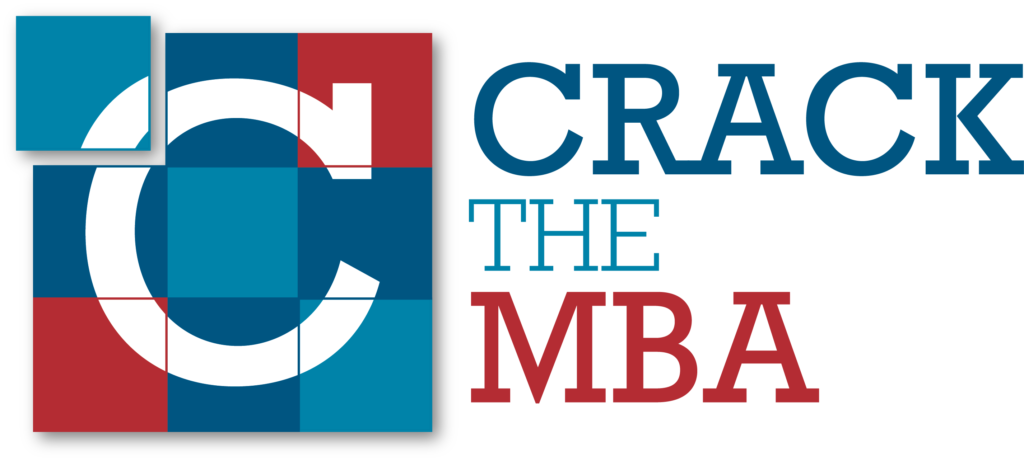
MBA Essay Types by School – 2025 Prompts
| Essay Type | School | 2025 Prompt Example |
|---|---|---|
| Goals Essay | Wharton | How do you plan to use the Wharton MBA program to help you achieve your future professional goals? |
| Goals Essay | Columbia | What are your career goals over the next three to five years and what is your long-term dream job? |
| Goals Essay | Texas McCombs | What ambitious goal or change do you aim to achieve with an MBA, and why is Texas McCombs your ideal launch pad? |
| Self-Reflection Essay | Stanford GSB | What matters most to you, and why? |
| Self-Reflection Essay | Berkeley Haas | What makes you feel alive when you’re doing it, and why? |
| Self-Reflection Essay | Georgetown McDonough | Reflect on a time you supported someone and what that says about you. |
| Contribution & Impact Essay | Wharton | How do you plan to make specific, meaningful contributions to the Wharton community? |
| Contribution & Impact Essay | Cornell Johnson | How do you intend to make a meaningful impact on the Johnson community? |
| Contribution & Impact Essay | Duke Fuqua | What are 3 ways you expect to contribute at Fuqua? |
| Leadership & Teamwork Essay | Kellogg | Describe a difficult professional decision. What values guided your process and what did you learn? |
| Leadership & Teamwork Essay | Berkeley Haas | Tell us about the best team you worked with. What made it successful? |
| Leadership & Teamwork Essay | Goizueta | Describe a personal account where you demonstrated leadership. What made you proud or what did you learn? |
| Video Essay | Kellogg | 3 video questions: Intro, Goals, Challenge |
| Video Essay | MIT Sloan | Introduce yourself + 1 randomized video question |
| Video Essay | Georgetown McDonough | Share what recently brought you joy outside of work (1 min) |
| Optional Essay | Columbia | Provide context for any gaps or concerns in your application (500 words max) |
| Optional Essay | Darden | Explain extenuating circumstances or unusual choices (optional essay) |
| Application Form Essay | London Business School | Describe your job responsibilities and outside interests |
| Creative Essay | NYU Stern | Pick Six: Use six images with captions to introduce yourself |
| Creative Essay | Rice Jones | Tell the story of a photo that has value in your life (written or video) |
| Creative Essay | Duke Fuqua | “25 Random Things” about you |
Which MBA Essay Types Matter Most?
The most important MBA essay types tend to be:
- Goals Essay – clarity of purpose
- Self-Reflection – depth and authenticity
- Contribution – fit with the school
- Leadership – future potential
Knowing these formats allows you to strategically reuse and adapt content across schools and apply the right MBA essay tips to each.
Importance of MBA essays
Having a strong GMAT or GRE score is just the starting point for a competitive MBA application. But in a world where thousands of applicants present stellar test scores, academics, and resumes, your MBA essay becomes the key differentiator. It’s your chance to break through the noise and show admissions committees who you really are.
Test scores may prove your academic ability, but MBA essays showcase your story, your motivations, your growth, and the why behind your choices. A powerful essay can even offset a low GMAT score or GPA. But no test score can rescue a weak, generic, or disconnected essay. That’s how important this part of the application is.
And what makes a great MBA essay truly impressive? One that reflects the real you. That’s exactly what business schools are looking for.
Jennifer Hayes, Senior Associate Director at Kellogg says, “We are looking for the story YOU wish to tell. The best essays I’ve read have heart, are not over-edited, and let the applicant’s personality emerge.”
What do MBA admissions committees want to see in your essays?
At the heart of every strong MBA essay is a simple goal: to help the admissions committee get to know you—the person behind the resume, the test scores, and the transcripts.
MBA admissions committees want a genuine, personal reflection of your experiences, motivations, and values. They aren’t looking for perfection; they’re looking for authenticity. They want to understand your decision-making, your aspirations, and the impact you aim to create. That’s why every top program—regardless of how differently they phrase their essay prompts, essentially asks: Who are you, and why do you want an MBA?
The Stanford GSB admissions committee says it best:
“There is no typical Stanford MBA student, no ideal for applicants to chase. Our advice is to just focus on you and ensure that your application is a true reflection of yourself.”
Chad Losee, Former Managing Director of MBA Admissions and Financial Aid at Harvard Business School, echoes the same sentiment. He emphasizes that the essay is an opportunity to learn more about the applicant’s story—what drives them, how they’ve made decisions, and the events that have shaped their lives
Here are five key takeaways Chad shares for writing a strong MBA essay:
- Add something new – don’t restate your resume.
- Stay within the limit – HBS introduced a 900-word cap to encourage clarity.
- Make it personal – your essay should be so specific that no one else could write it.
- Help us understand you better by the end of the essay.
- Don’t over-edit your personality in the name of polish.
Now that you know what MBA admissions committees wish to see in your essays, let’s take a look at how to write an essay that impresses them.
Five Tips to Write an Impressive MBA Essay
If you want your application to stand out, follow these proven MBA essay tips. These insights, backed by admissions committee advice and years of success stories, will help you write essays that are both powerful and personal.
1. Be Authentic
Let your personality lead the story
Admissions officers want to understand who you are, not who you think they want. Share real experiences that shaped your mindset, career goals, or values—even if they’re not traditionally impressive. Vulnerability builds connection.
2. Structure Your Essay
Past → Pivot → Post-MBA Future
Start with a snapshot of your background, transition into a defining moment that led you to consider an MBA, and close with how a specific school will prepare you for your goals. This narrative keeps the reader grounded and engaged.
3. Answer the Prompt
Relevance is more important than elegance
Even beautifully written essays fail if they don’t answer the question. Break the prompt into parts and address each clearly. Don’t shoehorn in achievements unless they directly serve the point you’re making.
4. Be Succinct
Depth over breadth, clarity over complexity
Most MBA essays have tight word limits. Pick 1–2 experiences and reflect deeply rather than listing multiple surface-level wins. Every sentence should add value or insight into your motivations, character, or impact.
5. Customize for the School
Show genuine alignment with the program
Go beyond name-dropping a few courses—explain why a school’s approach, culture, or specific opportunities resonate with your personal and professional journey. This shows initiative and true interest.
1. Be Authentic
Don’t write what you think the people on the admissions committee want to read. Your best selling points are the things and experiences that make you unique. Each essay should give a clear picture of who you are, what drives you, and what you’re passionate about.
Don’t write what you think the people on the admissions committee want to read. Your best selling points are the things and experiences that make you unique. Each essay should give a clear picture of who you are, what drives you, and what you’re passionate about.
In a similar way, don’t feel like you have to fit the “ideal” candidate’s profile. The admissions committee will see right through this, and you could end up hurting your chances of getting in more than helping. Instead, put all your energy into just being yourself.
Kris Mercuri, Former Deputy Director of Admissions, Recruiting and Outreach at the Yale School of Management states, your essay is an “opportunity to speak in your own voice about something meaningful and distinctive in your life.” Don’t waste this opportunity by writing about something inauthentic that you think will make you look better, but is actually a pretense.
2. Structure Your Essay Strategically
A compelling MBA essay is not just about what you say, it’s also about how you say it. Without a clear structure, even the most inspiring story can feel scattered or difficult to follow. Admissions committees read thousands of essays, so a well-organized narrative can help your story stand out.
A simple and effective structure includes three parts:
- The Setup (Past & Present)
Begin by grounding the reader in your background. Briefly explain who you are, what you’ve done, and the values or experiences that have shaped your journey so far. This builds context and helps the reader understand where you’re coming from. - The Pivot Point (Moment of Realization)
Introduce the turning point—the moment you realized you needed something more. Perhaps you hit a ceiling at work, faced a leadership challenge, or became inspired to shift industries. This is where you highlight the gap between where you are and where you want to be. It shows self-awareness and intention. - The Future (MBA & Beyond)
End with a forward-looking vision. Explain what you hope to achieve post-MBA and how the specific program you’re applying to will help you get there. Be specific: mention skills you want to build, courses that interest you, or communities you hope to engage with.
This structure ensures your MBA essay reads like a journey—with a clear beginning, meaningful transition, and purposeful destination.
It also demonstrates critical thinking, planning, and storytelling, three traits every top business school values.
Answer the specific question asked
You’d be surprised how many well-written essays completely miss the actual prompt. No matter how impressive your story is, if it doesn’t answer the question, it won’t land.
You might craft a beautifully written piece about your leadership journey, but if the question asked you about a professional failure, the essay fails, no matter how good it sounds.
Before you begin writing, break down the prompt.
Ask:
- What is the school really trying to learn about me?
- What qualities or insights are they evaluating with this question?
- Am I clearly answering every part of the question?
Also, avoid repurposing the same essay for multiple schools without tailoring it. Even subtle differences between prompts matter. For instance, one school might ask about why you need an MBA now, while another may focus on how their program aligns with your goals. Don’t gloss over the nuance.
MBA essay tip: Read the prompt. Highlight keywords. Then, outline your response before you write.
Remember: answering the question directly doesn’t limit creativity; it gives it purpose.
Be Succinct
In our experience, several of the best full-time MBA programs are imposing tighter word limits on essays. In recent application cycles, many schools have lowered their required essay word counts, including Michigan Ross, Stanford GSB, UCLA Anderson, and Duke Fuqua. Harvard Business School, which previously did not have a word limit, introduced a 900-word limit on its single prompt in the year 2022-23. Moreover, schools are also mandating checks in their applicant portals, where candidates are no longer able to exceed word limits either. Keeping these patterns in mind, it’s important to remember one important piece of guidance: keep it short and sweet.
Focus on giving a few essential highlights, peppering in some intriguing details, and letting your true voice come through in your writing rather than trying to inundate the reader with information. Explain your decisions, highlight your achievements, and talk about what you’re passionate about. It will be easier to accomplish this goal if you narrow the scope of your essays.
Write Business School specific essays
This is one of the most overlooked yet crucial MBA essay tips: customize your essays for each school. A generic essay signals to the admissions committee that you haven’t done your research, and that you may not be truly invested in their program.
Use your essay to show:
- Why does this specific school fit your goals
- What excites you about their curriculum, community, or culture
- How you’ll contribute meaningfully as a student
Instead of writing, “I’m excited to attend your top-ranked MBA program,” say:
“I’m excited to explore courses like ‘Leading Innovative Organizations’ and contribute to the Energy & Sustainability Club, building on my experience in clean tech.”
This shows that you’ve done your homework and thought deeply about how the program aligns with your path.
MBA essay tip: Name specific electives, clubs, professors, and school values but only when relevant to your story.
Admissions committees want to see a clear fit between who you are, what you want to do, and what their MBA can offer.
Do you want to impress the MBA Adcom with your essay?
At Crack The MBA, we have helped hundreds of students get into top MBA programs around the world. We would be happy to help you too. Schedule a consultation with us today to learn more about our services and how we can help you get into your dream school.
10 mistakes to avoid in your MBA essays
Now that you know how to write an impressive MBA essay, one that reflects your authentic self, answers the prompt, and aligns with your target school, it’s just as important to understand what not to do. Even a well-intentioned essay can fall flat if you make avoidable errors that weaken your message or distract the reader.
Let’s explore some of the most common MBA essay mistakes applicants make and how you can steer clear of them to strengthen your overall application.
Here are 10 mistakes you should avoid in MBA essays:
🚫 Top 10 MBA Essay Mistakes to Avoid
- 1. Starting too late Give yourself at least 10–12 weeks to complete multiple school applications thoughtfully.
- 2. Skipping school research Generic essays won’t cut it. Show why you’re a great fit for each school.
- 3. Recycling essays Tailor each essay. Reused content is obvious and shows a lack of effort.
- 4. Ignoring the prompt Answer all parts of the essay question directly and thoroughly.
- 5. Copying sample essays Your voice and authenticity matter more than sounding “perfect.”
- 6. Including too many stories Stick to 1–2 impactful examples. Less is more when it’s well told.
- 7. Repeating your resume Use essays to add insight and depth—not restate your LinkedIn profile.
- 8. Lack of introspection Show how events shaped you, not just what happened.
- 9. Skipping proofreading Typos and grammar errors hurt your credibility. Always review.
- 10. Weak flow and transitions Your essay should read like a well-connected narrative, not a list.
1. Starting Too Late
Writing a compelling MBA essay takes time. If you rush the process, you’ll likely miss opportunities for deeper reflection, edits, and customization.
✅ Tip: Allocate at least 10–12 weeks for 4–5 applications. Give each essay the attention it deserves.
2. Skipping School Research
Generic essays that don’t reference a school’s unique programs, values, or culture fall flat. Admissions committees want to know why their MBA is right for you.
✅ Tip: Demonstrate fit by mentioning courses, clubs, or culture-specific aspects of the school.
3. Recycling the Same Essay Across Schools
Copy-pasting the same essay into multiple applications is a red flag. Each school is looking for a tailored response that shows intentionality.
✅ Tip: Customize at least 30–40% of each essay to reflect the school’s specific offerings.
4. Ignoring the Full Essay Prompt
Many candidates only answer part of the question, or go off-topic entirely. This shows carelessness and can cost you a spot.
✅ Tip: Break down the question into parts. Make sure you address each component directly.
5. Copying Sample Essays
Reading sample MBA essays for inspiration is fine, but copying tone, structure, or stories makes your essay generic and inauthentic.
✅ Tip: Focus on your own voice. The essay should reflect you, not someone else’s playbook.
6. Cramming Too Many Stories
Listing multiple accomplishments can overwhelm the reader and dilute your narrative. Quality matters more than quantity.
✅ Tip: Choose 1–2 strong examples and go deep with reflection and impact.
7. Repeating What’s Already in Your Resume
Your MBA essay should add new insight, not just restate your career timeline.
✅ Tip: Use the essay to explain motivations, decisions, transitions, and what you’ve learned—not just what you’ve done.
8. Lack of Introspection
Essays without self-reflection feel shallow. Admissions committees want to know what experiences meant to you—not just what happened.
✅ Tip: Ask yourself “Why was this important?” or “How did this change me?” after every major point.
9. Skipping Proofreading
Typos, grammar mistakes, or awkward phrasing undermine your professionalism.
✅ Tip: Read your essay aloud, then ask at least one trusted reader to review it before submitting.
10. Weak Flow and Transitions
An essay that jumps from idea to idea without coherence is hard to follow and easy to forget.
✅ Tip: Use clear transitions and paragraph breaks. Your essay should read like a well-structured story with a beginning, middle, and end.
Final Thoughts
Getting into a good business school can be hard if you don’t know how to write a great MBA admissions essay.
But the process is much easier to handle if you know where to start, make an outline for each essay, and get help from an expert. If you follow these steps, you’ll be able to write a great MBA essay!
Get in touch with us for expert help on your essays. As a result of our interactions with MBA admissions committee members at all top schools, we understand what the MBA admissions committee looks for in a candidate and can advise you appropriately.
Do you want to impress the MBA Adcom with your essay?
At Crack The MBA, we have helped hundreds of students get into top MBA programs around the world. We would be happy to help you too. Schedule a consultation with us today to learn more about our services and how we can help you get into your dream school.
Author
Related Posts:
Recent Posts
Archives
Ready for Expert Guidance?
Get personalized support to craft your winning MBA application.
Schedule Free Consultation

